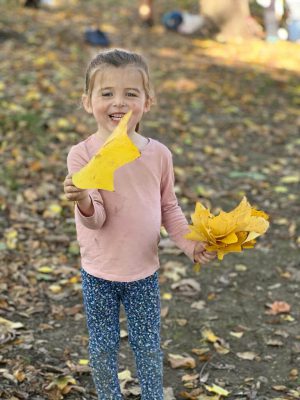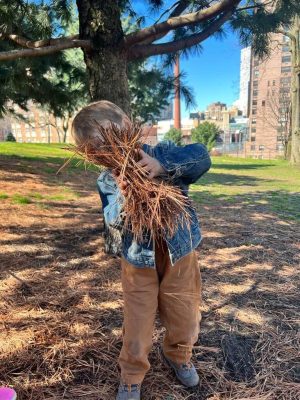BLOG

La Vie en Vert
Through our nature school program, the children
developed a deep relationship with the park and a sense
of civic responsibility to take care of nature.
Through our nature school program, the children developed a deep relationship with the park and a sense of civic responsibility to take care of nature.
One day, we noticed pieces of glass at the base of an oak tree. The children were surprised and concerned to see this. They then took walks in the park and found litter throughout it – plastic gloves, beer cans, paper, and plastic bags just to name a few – all kinds of objects that don’t belong in nature and showed a lack of care for the environment. We spent some time as a group asking ourselves what we could do to keep the park clean, and the children eventually came to the conclusion that we should pick up the trash and throw it away. Next, we considered what we could do so that everyone would respect the park. The children suggested ideas to ask others in the park nicely to keep it clean and to write a letter that we could hang in the park expressing this message.
We put their ideas into action – cleaning up the park as a school community, as well as writing a letter with their thoughts about caring for nature.
The children have become very invested in cleaning up the park to prevent animals from getting hurt and to allow nature to stay as pure as possible. We have also talked about urban nature and have wondered if we would witness a similar situation with trash in forests or at the nearby beaches.
Their ideas developed into an art project, including both photos of the children with pieces of trash they have found in the park and a letter sharing their thoughts and ideas about caring for nature.
In this letter, we ask our community to take a pledge along with us:
–Nous promettons de ne pas jeter nos déchets par terre.
-Nous promettons de ramasser les déchets que nous trouvons.
-Nous promettons de voir la vie en vert.
Thank you to our photographer, Géraldine Pierson, as well as our LLS families and teachers who translated our French letter into Russian, Spanish, Chinese, and English.

Nature School at LLS
Preparing for the 2020-21 school year at LLS brought with it a process of rethinking each of our policies and preparing for different circumstances than ever before, as we worked to reopen our school during a pandemic. This was a labor of love, adjustment, and resilience. After many professional conversations and workshops with New York officials, health experts, and colleagues, as well as collaboration with the Brooklyn Coalition of Early Childhood Programs, we made the decision to transition to a nature school program.
We spend as much time as possible at Fort Greene Park. Except for days when weather does not permit, we learn together in an outdoor classroom. Early childhood is all about discovering the world around us through exploring and engaging with people and the environment and materials to develop a sense of identity and skills — language, math, science, and relationship skills. Our goal through outdoor learning is to welcome children each day in the most safe environment and give them multiple opportunities to experience socially, emotionally, physically, and cognitively.
We have seen in years past that our many walks to the park provided the children with limitless possibilities for play and learning and that during this time, they built, questioned, and expressed knowledge and meaningful ideas about the world around them. Outdoor learning provides children both the safest space in which to socialize and an inspiring educational environment. When children are in nature, deep learning takes place in the areas of ecology, biology, botany, math, physics, and engineering. Nature is an ideal place for immersing the children in an environment that interests them so that they can take information in and retain it.
At LLS, we know that young children learn best through hands-on discovery and when they are relaxed and having fun. We keep children excited about learning by building on their own discoveries and interests. Nature provides an incredible setting for these experiences. Through their own hands-on explorations and with questions designed to elicit conversation, the children form ideas about the world around them. The care and protection of nature and the environment is a central aspect of these experiences. At the same time, learning extends beyond the exploration of nature, as children form a deeper understanding of our relationship to the natural world as a community. This includes both our classrooms and the greater community we are a part of. As children explore the outdoors, they develop a deeper sense of the way nature impacts our needs. For example, when it is hot and sunny, we become thirsty, and when it is raining, we need shelter. This extends to a sense of how we can better care for our community and think about the needs of others.
We are having such a strong, successful school year and are proud of the ways our program has adapted to these new, unprecedented circumstances.
